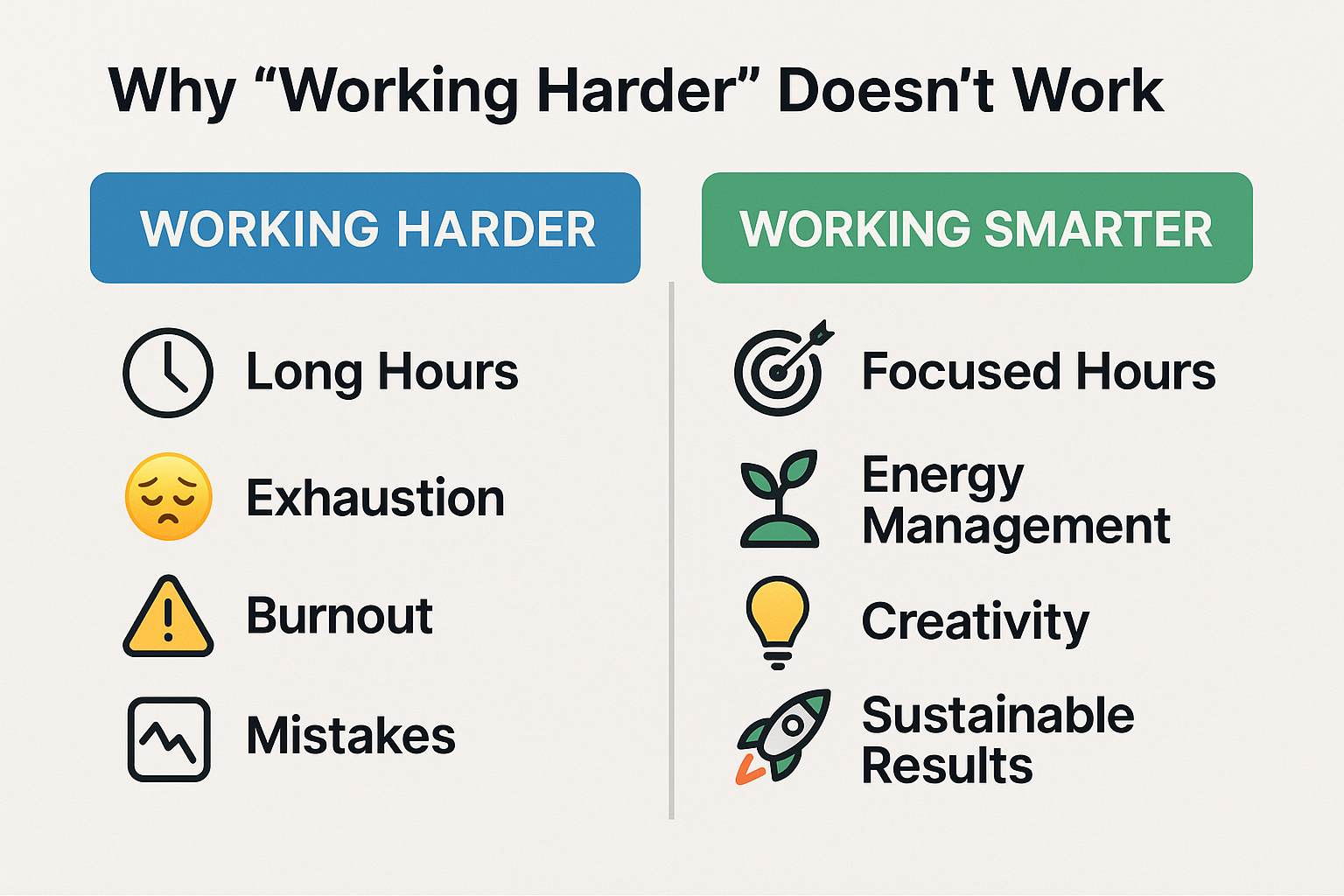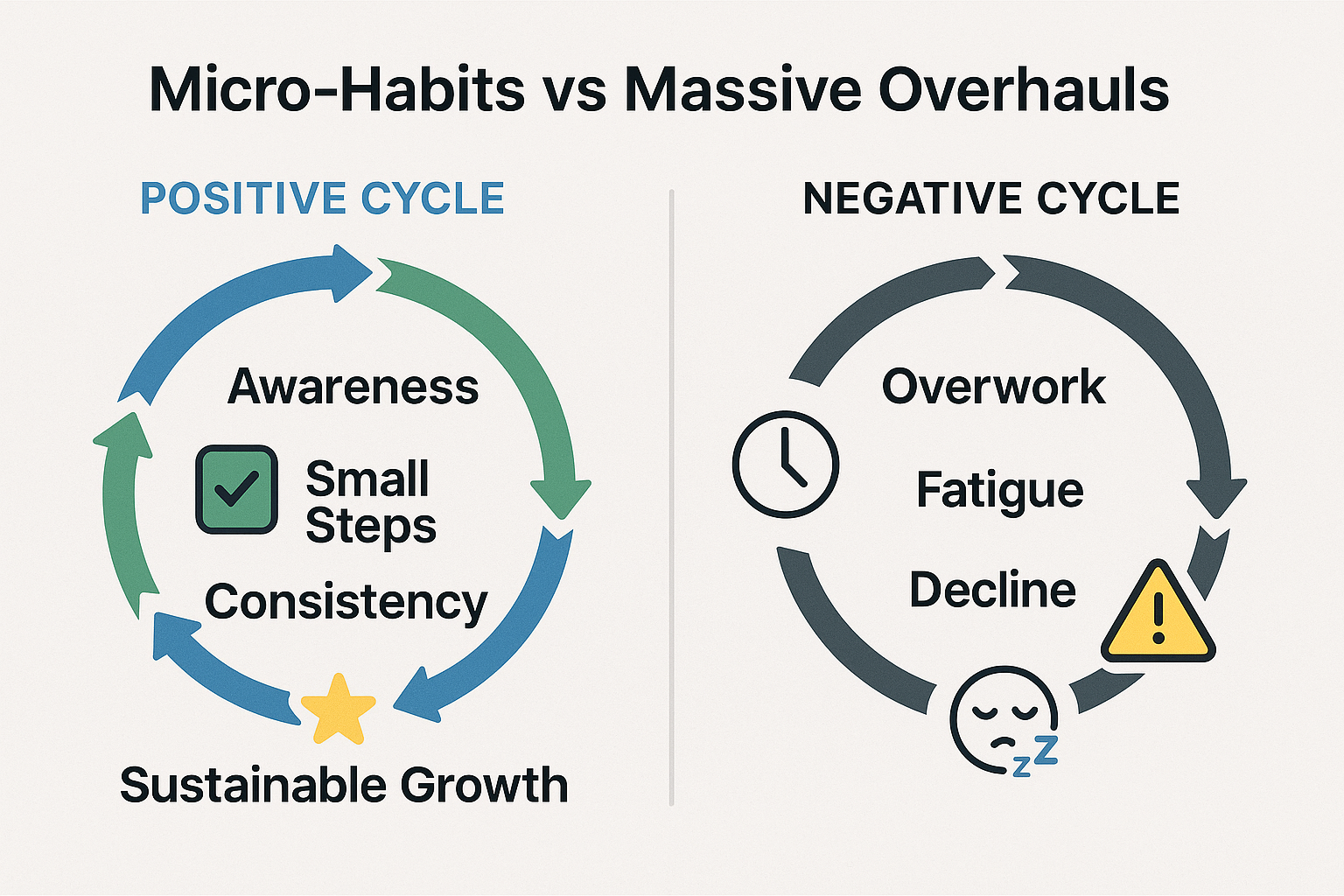Do you ever feel like you’re giving everything at work but still not really getting ahead?
You’re not the only one. Many professionals stay up late, answer endless emails, and keep pushing harder only to feel exhausted and frustrated when the results don’t match the effort.
Here’s the thing:
Working more hours doesn’t automatically mean working better. In fact, it’s often the quickest way to hit burnout without making real progress.
What really makes the difference?
Shifting your focus from just “working harder” to working smarter. That means building better habits, using the right systems, and making sure your daily actions are tied to the results that matter most.
And this isn’t just theory, it’s backed by behavioral science, proven workplace practices, and data from high-performing teams. The best part? You don’t have to give up your evenings, weekends, or peace of mind to see the benefits.
These are the exact performance-boosting habits that GWork helps teams build into their daily workflow. So if you’re ready to see real change, keep reading and start improving your performance the smarter way.

Why “Working Harder” Doesn’t Work – And What to Do Instead
We’ve been sold a lie.
Somewhere along the way, “success” got tangled up with exhaustion. The unspoken rule? If you’re not putting in insane hours, you’re not trying hard enough.
Here’s the reality: working more doesn’t guarantee better results, but it often guarantees worse ones.
The Myth of Long Hours = Better Results
Yes, there are seasons where extra effort matters. But making “always on” your default mode backfires. Your brain isn’t a machine; it’s more like a high-performance engine that needs pit stops. Without recovery, output and quality suffer fast.
Think about it: how many times have you powered through a late-night grind… only to redo that work the next day because of sloppy mistakes?
How Burnout Kills Productivity & Creativity
Burnout isn’t just being “tired.” It’s your brain’s way of saying: System overload and shutting down non-essential functions.
- Focus tanks – You are more easily distracted.
- Decision-making slows – Simple choices feel like heavy lifts.
- Creativity flatlines – You stick to “safe” ideas instead of innovative solutions.
Even if you think you’re pushing forward, you’re often spinning your wheels.

Behavioral Science Proof: Micro-Habits > Massive Overhauls
Research suggests that sustainable performance grows from consistent, small actions we take regularly. It’s not about those occasional big efforts, but rather the simple, repeatable steps that add up over time!
Why? Because micro-habits:
- Reduce cognitive load
- Fit naturally into your day
- Trigger consistent progress without draining willpower
Rather than trying to completely change your workflow all at once, aim to make small, easy adjustments that create lasting progress.
Check out this eye-opening productivity stat: According to a Stanford study, productivity can plummet by as much as 40% when employees work 60 hours or more a week. The takeaway? Longer hours don’t equal better results.
This is exactly why GWork is here! We’re all about helping teams reach their ambitious goals by adding simple, effective habits right into the tools you already love to use… so you can boost productivity without feeling overwhelmed.
10 Proven Ways to Improve Work Performance Without Burning Out
1. Start Your Day With Priority Clarity
Most teams don’t lose productivity because they’re lazy – they lose it because they start the day reacting instead of leading it.
Before you open your inbox, take three minutes to define your Top 3 Priorities:
- Write down the three outcomes that matter most today.
- Rank them by impact, not urgency.
- Commit to tackling #1 before you touch anything else.
💡 Mini Case Study: A SaaS leadership team we worked with cut their average project turnaround time by 18% just by embedding this ritual into their morning Slack check-in. GWork auto-prompted each manager to declare their Top 3, making priorities visible and focused before the day got hijacked.
2. Use the 80/20 Rule for Ruthless Prioritization
Your to-do list is lying to you. Not every task moves the needle.
Apply the Pareto Principle: 80% of your results often come from 20% of your actions. Identify the high-use activities and push the rest to later – or off the list entirely.
Quick filter: “If I do this, will it materially improve time to market, customer satisfaction, or revenue this quarter?”
If not, delegate, automate, or delete it.
When GWork teams track this weekly, they see patterns – low-value tasks become visible, making it easier to cut the noise and double down on what drives measurable impact.
3. Optimize Communication Loops
Deadlines aren’t missed because people don’t care. They’re missed because the next step isn’t clear.
End every meeting with one minute to lock in:
- Who owns the next action
- What exactly is happening next
- When it’s due
It’s such a small shift, but it speeds execution, reduces bottlenecks, and keeps customer-facing work on track.
💡 Mini Case Study: A financial services client embedded a “1-Minute Next Step” habit into all cross-department meetings. Within two months, they shaved days off their client onboarding process and saw a 12% bump in customer satisfaction scores. Read the full case study here.
4. Build Micro-Habits Into Your Workflow
Big changes fail because they live in separate tools, outside your team’s actual workflow. Micro-habits stick because they piggyback on what you’re already doing.
Example: After your daily stand-up, spend exactly two minutes clearing blockers. You’re already in “update mode,” so it takes almost no extra effort – and prevents small issues from growing into delivery delays.
In GWork, we nudge teams right after stand-up in Slack or Outlook to review blockers. That two-minute ritual compounds into faster sprints and smoother handoffs.
5. Use Behavioral Nudges for Accountability
Accountability doesn’t have to mean micro-managing. A simple, well-timed nudge can keep performance on track.
Think:
- Public commitments in your team channel
- Automated reminders before key milestones
- Visual habit trackers that make progress visible
In GWork, habit streak gamification turns this into a game – teams see their streaks grow, and nobody wants to be the one to break the chain. It’s light-touch accountability that sticks.
6. Swap Multitasking for Time-Blocking
Multitasking feels productive, but it’s a focus killer. Research shows it can slash output by up to 40%.
Time-blocking flips that:
- Choose your key work categories (Deep Work, Meetings, Emails, Planning).
- Block them in your calendar like immovable meetings.
- Guard them fiercely – no last-minute meeting requests allowed in deep work time.
GWork integrates this by pulling your top priorities into protected calendar blocks, making focus the default.
7. Invest in Skills That Remove Bottlenecks
Bottlenecks waste more than time – they stall momentum, frustrate teams, and hit customer timelines.
Audit quarterly: Where does work slow down because only one person can do it?
Then:
- Cross-train team members
- Create quick “how-to” video libraries
- Automate repetitive steps
💡 Mini Case Study: A hybrid tech company used GWork to identify and tackle a report-generation bottleneck. By training two backup owners and automating data pulls, they reclaimed 12 hours per week – and cut customer support ticket resolution by 15%.
8. Take Strategic Breaks to Boost Energy
Your brain runs on cycles, not willpower. After 90 minutes of deep work, performance drops.
Protect your output with planned resets:
- 25:5 Pomodoro bursts for quick-moving tasks
- 90-minute deep work cycles followed by 15–20 minute recovery breaks
These aren’t “nice-to-haves” – they’re how you sustain quality thinking all day.
9. Master the “Stop Doing” List
Every “yes” is a “no” to something else. Prune your calendar weekly:
- Kill unnecessary meetings
- Cut reports no one reads
- Drop legacy processes that don’t add value
This is operational efficiency at its simplest – and it frees capacity for the work that actually moves business outcomes.
10. Protect Recovery Time Like a Deadline
Recovery isn’t a perk – it’s a performance multiplier.
That means:
- Blocking wind-down time in your calendar
- Treating it with the same respect as a client meeting
- Encouraging your team to do the same
In GWork, recovery time gets tracked like any other high-priority habit. Teams that protect it see sharper decision-making, better creativity, and far less burnout.
Bringing It All Together: The Habit-First Approach to Sustainable High Performance
The truth about productivity?
It’s not about doing more. It’s about doing the right things over and over without burning yourself out.
When you know your priorities, build habits that support them, and give yourself time to recharge, everything gets easier. You stop forcing it with willpower and start moving on autopilot.
It really comes down to three things:
- Habits → so the important stuff happens, even on chaotic days.
- Clarity → so you only spend energy on what matters most.
- Recovery → so your brain and body stay sharp for the long run.
Ready to See It in Action?
Looking for real, proven ways to improve work performance? Instead of theory, why not test it yourself?
Run a 3-week GWork pilot with just one department or your leadership team. Together, we’ll pick 3 high-impact habits, track them daily, and measure the difference in delivery speed, collaboration, and engagement.
Teams often see noticeable improvements – without adding extra hours or overhauling everything at once.
Want to explore the habits that could move the needle for your team?
FAQs On How to Improve Work Performance
1. How can I improve my work performance without burning out?
You can improve work performance without burning out by focusing on small, repeatable habits that build clarity, focus, and energy over time.
Instead of working longer hours, use tools like GWork to track and reinforce the three habits that have the biggest impact on your productivity and well-being.
Tip: In just 3 weeks, a GWork pilot can help you see measurable gains without the stress spiral.
2. What are the best habits to boost productivity and avoid stress?
The best habits to boost productivity without stress are:
- Daily clarity rituals – Start your day knowing your top 3 priorities.
- Focused deep work blocks – Work in distraction-free sprints.
- Recovery breaks – Short recharge moments to reset your brain.
GWork helps teams identify and implement these habits, tracking progress automatically so you stay consistent without extra effort.
3. How can teams work smarter instead of harder?
Teams work smarter by aligning on the right habits, not just pushing for more hours.
GWork uses behavioral science to pinpoint high-impact routines, helps you measure performance improvements, and keeps everyone accountable – without micromanaging.
In one case study, a team improved 28% in output in just 90 days while reporting lower stress levels.
4. Is it possible to get more done at work without sacrificing work-life balance?
Yes – when you focus on habit optimization instead of hustle culture.
GWork supports work-life balance by helping you set realistic goals, track daily wins, and build recovery into your workflow so you’re more productive and less exhausted.
The result: more output, more energy left ultimately.
5. How does GWork prevent burnout while improving results?
GWork prevents burnout by:
- Highlighting the habits that lead to peak performance.
- Tracking execution so you see progress daily.
- Encouraging recovery as a core part of the process.
By focusing on behavioral change instead of raw effort, GWork helps you deliver more value without running on fumes.
6. What’s the fastest way to see improvement with GWork?
The fastest way is to start a 3-week pilot where you:
- Identify 3 key performance habits.
- Measure them daily with GWork.
- Review results weekly to tweak your approach.
Most teams see a measurable boost in clarity, focus, and output within the first month – without extra hours. Book a demo to get started.
7. How can managers improve work performance without causing burnout?
Managers can boost team productivity by replacing vague “work harder” directives with clear, habit-driven performance systems.
With GWork, you can see exactly which behaviors move the needle, give feedback based on data, and create a culture of sustainable performance – reducing turnover and burnout risk.
8. Can GWork work for remote or hybrid teams?
Absolutely.
GWork is built for remote, hybrid, and in-office teams, using lightweight check-ins and habit tracking that fit into any workflow.
No endless meetings, no micromanaging – just clear insights into what’s working so teams stay productive and balanced anywhere.
9. Why is working harder not always the answer?
Working harder often leads to diminishing returns – your brain tires, decision-making worsens, and mistakes increase.
The key is to work better by optimizing the right habits.
That’s exactly what GWork helps you do: find the high-impact actions that give you more results per hour worked.
10. How do I know if my team is at risk of burnout?
Warning signs include:
- Consistently long work hours
- Declining quality of output
- Low engagement or morale
- Increased sick days or absenteeism
GWork helps managers spot early burnout signals by tracking energy, engagement, and key habit consistency – allowing you to fix issues before they escalate.
The Right Habits Change Everything
Finding sustainable ways to improve work performance isn’t about working longer hours. It’s about building smarter systems. The truth is, small daily habits shape how you focus, collaborate, and recover. When those habits are intentional, performance naturally rises without the burnout.
Every day you wait, old patterns of reactive work and scattered priorities get reinforced. But the sooner you shift toward clarity, consistency, and recovery, the sooner you unlock the productivity and energy you’ve been missing.
Ready to stop guessing and start improving?
Get your free GWork habit blueprint today →
Ready to close the strategy-execution gap?


